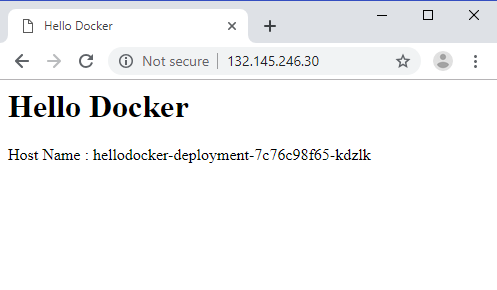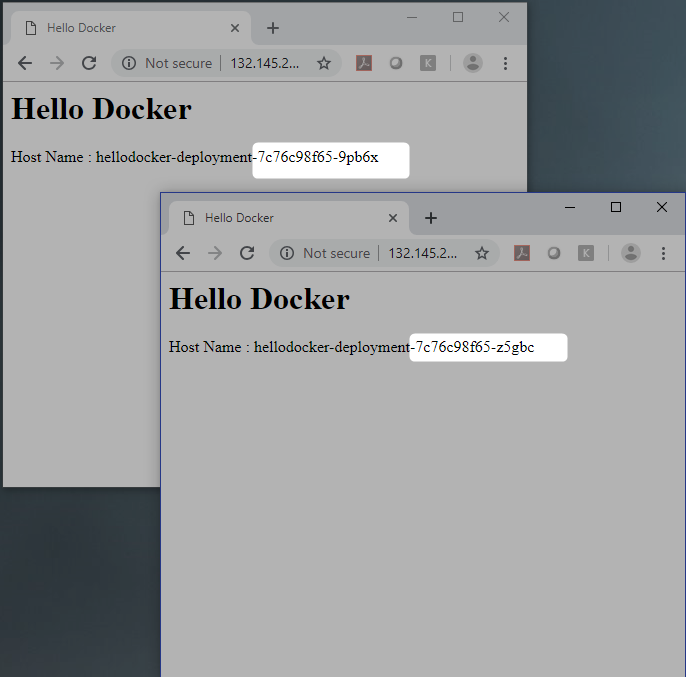Deploy Custom Docker Image To OKE Cluster
We will do the Following
- Push custom Docker image to OCI Registry
- Deploy this custom docker image to OKE
- Scale it
Prerequisites
- Make sure you have set up OKE Cluster
- Make sure you have pushed Hello Docker Image to OCI Registry
Create Kubernetes seceret
Format
kubectl create secret docker-registry ocirsecret --docker-server=<region-code>.ocir.io --docker-username='<tenancy-name>/<oci-username>' --docker-password='<oci-auth-token>' --docker-email='<email-address>'
Actual Command
$ kubectl create secret docker-registry ocirsecret --docker-server=fra.ocir.io --docker-username=demo/nadeem@abc.com --docker-password=A<AFDS}r2[754:{o> --docker-email=nadeem@abc.com
secret "ocirsecret" created
If your tenancy is federated with Oracle Identity Cloud Service, use the format {tenancy-name}/oracleidentitycloudservice/{username} for user name
$ kubectl create secret docker-registry ocirsecret --docker-server=fra.ocir.io --docker-username=demo/oracleidentitycloudservice/nadeem@abc.com --docker-password=A<AFDS}r2[754:{o> --docker-email=nadeem@abc.com
secret "ocirsecret" created
$ kubectl get secrets
NAME TYPE DATA AGE
default-token-g8xkv kubernetes.io/service-account-token 3 20m
ocirsecret kubernetes.io/dockerconfigjson 1 12s
NOTE: If you create your ocirsecret manifest manually (for example, when creating a Helm chart template), keep in mind that the secret MUST be of type: kubernetes.io/dockerconfigjson, otherwise it will not use the credentials and will try to pull down the image as an anonymous user.
Create Kubenetes Manifest File
hellodocker-lb.yml
apiVersion: apps/v1
kind: Deployment
metadata:
name: hellodocker-deployment
spec:
selector:
matchLabels:
app: hellodocker
replicas: 1
template:
metadata:
labels:
app: hellodocker
spec:
containers:
- name: hellodocker
image: fra.ocir.io/demo/docker-registry/hellodocker:1.0
ports:
- containerPort: 80
imagePullSecrets:
- name: ocirsecret
---
apiVersion: v1
kind: Service
metadata:
name: hellodocker-service
spec:
type: LoadBalancer
ports:
- port: 80
protocol: TCP
targetPort: 80
selector:
app: hellodocker
image: {region-code}.ocir.io/{tenancy-name}/{repo-name}/{image-name}:{tag}
for imagePullSecrets specify the secreted created, in this case ocirsecret
Note initially there is only one replica
Deploy kubernetes application
$ kubectl create -f hellodocker-lb.yml
deployment.apps "hellodocker-deployment" created
service "hellodocker-service" created
Observe there is only one deployment
$ kubectl get deployments
NAME DESIRED CURRENT UP-TO-DATE AVAILABLE AGE
hellodocker-deployment 1 1 1 1 29s
$ kubectl get pods -o wide
NAME READY STATUS RESTARTS AGE IP NODE
hellodocker-deployment-7c76c98f65-9pb6x 1/1 Running 0 38s 10.244.2.2 10.0.11.2
keep a note of external ip address
$ kubectl get services
NAME TYPE CLUSTER-IP EXTERNAL-IP PORT(S) AGE
hellodocker-service LoadBalancer 10.96.89.63 132.145.246.30 80:31296/TCP 57s
kubernetes ClusterIP 10.96.0.1 <none> 443/TCP 28m
OCI Loadbalancer would be automatically created.

Access the application with external ip address.

$ kubectl describe service hellodocker-service
Name: hellodocker-service
Namespace: default
Labels: <none>
Annotations: <none>
Selector: app=hellodocker
Type: LoadBalancer
IP: 10.96.89.63
LoadBalancer Ingress: 132.145.246.30
Port: <unset> 80/TCP
TargetPort: 80/TCP
NodePort: <unset> 31296/TCP
Endpoints: 10.244.2.2:80
Session Affinity: None
External Traffic Policy: Cluster
Events:
Type Reason Age From Message
---- ------ ---- ---- -------
Normal EnsuringLoadBalancer 4m service-controller Ensuring load balancer
Normal EnsuredLoadBalancer 3m service-controller Ensured load balancer
Scale Deployment
$ kubectl get deployments
NAME DESIRED CURRENT UP-TO-DATE AVAILABLE AGE
hellodocker-deployment 1 1 1 1 4m
$ kubectl scale --replicas=4 deployment/hellodocker-deployment
deployment.extensions "hellodocker-deployment" scaled
scaled
$ kubectl get deployments
NAME DESIRED CURRENT UP-TO-DATE AVAILABLE AGE
hellodocker-deployment 4 4 4 4 6m
$ kubectl describe deployment hellodocker-deployment
Name: hellodocker-deployment
Namespace: default
CreationTimestamp: Tue, 02 Apr 2019 00:20:25 +0530
Labels: <none>
Annotations: deployment.kubernetes.io/revision=1
Selector: app=hellodocker
Replicas: 4 desired | 4 updated | 4 total | 4 available | 0 unavailable
StrategyType: RollingUpdate
MinReadySeconds: 0
RollingUpdateStrategy: 25% max unavailable, 25% max surge
Pod Template:
Labels: app=hellodocker
Containers:
hellodocker:
Image: fra.ocir.io/srepreprod1/docker-registry/hellodocker:1.0
Port: 80/TCP
Host Port: 0/TCP
Environment: <none>
Mounts: <none>
Volumes: <none>
Conditions:
Type Status Reason
---- ------ ------
Progressing True NewReplicaSetAvailable
Available True MinimumReplicasAvailable
OldReplicaSets: <none>
NewReplicaSet: hellodocker-deployment-7c76c98f65 (4/4 replicas created)
Events:
Type Reason Age From Message
---- ------ ---- ---- -------
Normal ScalingReplicaSet 7m deployment-controller Scaled up replica set hellodocker-deployment-7c76c98f65 to 1
Normal ScalingReplicaSet 47s deployment-controller Scaled up replica set hellodocker-deployment-7c76c98f65 to 4
Note that host-name changes

Clean up
$ kubectl delete deployment hellodocker-deployment
deployment.extensions "hellodocker-deployment" deleted
This would automatically delete the loadbalancer .
$ kubectl delete service hellodocker-service
service "hellodocker-service" deleted